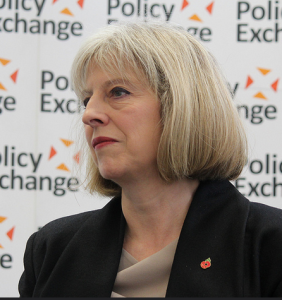U.K.’s Challenge: Reconciling Its Brexit Aims
Posted by hkarner - 4. April 2017
Date: 03-04-2017
Source: The Wall Street Journal By SIMON NIXON
 Prime Minister Theresa May needs a deal that achieves three objectives. But the objectives may be irreconcilable
Prime Minister Theresa May needs a deal that achieves three objectives. But the objectives may be irreconcilable
After nine months of phony war, the Brexit battle lines have been drawn.
Last week’s opening salvos were cloaked in generous diplomatic language. British Prime Minister Theresa May used her letter invoking Article 50 of the Lisbon Treaty to laud Europe’s liberal democratic values and declared her wish for a “deep and special partnership” with the European Union.
EU Council President Donald Tusk reciprocated by declaring the Brexit negotiations an exercise in “damage control” with the goal of keeping the U.K. as close a partner as possible.
The desire for an amicable divorce on both sides is sincere, not least because the consequences of a collapse of the legal frameworks underpinning current cooperation in areas such as trade, finance, science and security would be so severe. Yet neither side is confident that the obstacles to a deal can be overcome.
The greatest obstacles lie within the U.K. itself. Mrs. May faces what may prove an impossible trilemma.
She needs a deal that, first, is close enough to the EU to minimize disruption to business and allow the continued free flow of people, goods and services that are vital to the U.K.’s prosperity. Second, she needs a deal that will satisfy those in her own party who dream of a “global Britain” that can pursue an independent trade policy and cut regulation and taxes. Third, she needs a deal that will preserve the unity of the United Kingdom amid rising nationalism in Scotland and Northern Ireland and questions about the status of Gibraltar.
These three goals may be irreconcilable. The EU made clear in its draft negotiating guidelines that the price of a deep and comprehensive trade deal will be fiscal, social and environmental safeguards to protect the EU from suffering a competitive disadvantage through what it calls “social dumping.”
Brexiters fear that whatever right the U.K. may have regained in theory to strike its own trade deals and re-engineer its economic model would likely be constrained in practice as the country would remain bound by rules over which it no longer had any control.
On the other hand, the kind of “clean Brexit” demanded by hard-line Brexiters whereby the U.K. simply seeks to trade with the EU on World Trade Organization terms would not only cause maximum economic disruption, it would create a hard border with the Republic of Ireland which could fuel Irish nationalism and jeopardize the peace process.
If forced to choose, it seems clear which way Mrs. May intends to jump. In her public statements last week, she used the cloak of a largely confected row about whether she was blackmailing the EU by linking future security cooperation to a trade deal to drop many of the cherished goals of the hard-line Brexiters.
She accepted that British businesses would have to abide by EU rules—at least when doing business with the EU; that the U.K. would have to pay a financial price to secure an exit deal; and that far from gaining £350 million a week, as Brexiters famously promised, there would be “consequences” for the U.K. economy.
Meanwhile, ministers acknowledged that immigration from the EU might even go up after Brexit and that the U.K. would continue to abide by EU freedom of movement rules until the U.K. leaves the EU in 2019.
Privately, some cabinet ministers accept that further substantial compromises will be essential if the U.K. is to get any negotiated exit and trade deal. They believe that Mrs. May has established enough political capital with the Brexiters to negotiate whatever deal she thinks is in the national interest. They believe that many Brexiters will back down from their most hard-line demands if it helps to preserve the unity of the U.K.
These cabinet ministers also hope that even if Brexiters don’t like what Mrs. May agrees to, they will back her because once Brexit is delivered, it will be easier for future U.K. governments to renegotiate the deal. Besides, senior ministers point out that Mrs. May faces no obvious internal challengers, giving her a degree of political freedom.
Nonetheless, Mrs. May’s political capital is about to be severely tested. The EU’s draft negotiating guidelines show that the bloc will be tough in defending the interests of its member states. It won’t discuss future trade arrangements until the two sides have made “sufficient progress” toward a deal that will settle the U.K.’s financial obligations and which protects the rights of EU citizens currently settled in the U.K. Neither of these are straightforward.
Far more problematically, the EU is determined to find a solution that avoids a hard border in Northern Ireland before trade talks start and it wants to make any deal effectively conditional on the U.K. reaching an agreement with Spain over the future status of Gibraltar. Both of these may require compromises beyond even Mrs. May’s capacity to deliver.
Indeed, as Mrs. May contemplates her trilemma, it is clear that her need for a deal that strengthens the unity of the U.K. may be the toughest condition to fulfill.
Hinterlasse einen Kommentar